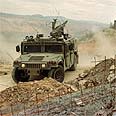
Israeli film flouts military myth
New effort by Joseph Cedar puts IDF in critical spotlight, says Israelis willing to 'run for their lives' despite patriotism
Just as the sun sets, an explosion rocks a mountain fort close to Israel's border with Lebanon.
In years past, such a blast might have sent Israeli soldiers scrambling to fend off attack by Lebanese Hizbullah terrorists.
But this time the commotion is staged, and the only shooting is by film cameras for the last scene of "Beaufort," a drama about Israel's whirlwind 2000 withdrawal from southern Lebanon.
For director Joseph Cedar, who spent much of his mandatory Israeli army service dodging Hizbullah ambushes in the so-called "security zone", making the movie was a catharsis of sorts.
"So many scenes are taken from my own experiences ... Just putting it on the screen is therapeutic," he says while sitting on the set, a Crusader-era castle chosen for its resemblance to the Beaufort Fort visible just across the Lebanese border.
"It's a story of any mountain in any battle. Soldiers died to capture it, died to protect it, and then found out its insignificance," Cedar said after re-enacting the demolition of the Israeli garrison at the fort by withdrawing troops.
Partly funded by Israel's government, the production reflects a shift in popular perceptions of a military that was long a force for national unity, its exploits against Arab foes invariably viewed as self-defence.
Sign of the times
Cedar describes "Beaufort" as a tale of scared combatants who, for all their patriotism, are willing to "run for their lives" rather than die for the principle of staying put.
Such talk may be a sign of the times in Israel.
Last year's pullout from the Gaza Strip, and the prospect of similar moves in the occupied West Bank in the face of more than five years of Palestinian revolt, challenged an Israeli axiom that keeping land won in war is a strategic necessity.
"Today, we look at ourselves as a normal society, under normal threats," said Yossi Klein Halevi of the Shalem Center, a conservative Jerusalem think-tank. "We are in a new, sober period where we are no longer deluded by myths."
Yet some Israelis worry that military cohesion and fighting spirit may be sapped by less-than-flattering screen depictions.
Celebration to circumspection
While few doubt that the Lebanon withdrawal greatly reduced casualties on both sides of the border, the consensus is that it also bolstered the anti-Israel hostility of Hizbullah's patrons, Iran and Syria, and emboldened Palestinians to take up arms.
To this day, Hizbullah's satellite television station, al-Manar, broadcasts videos of its attacks on Beaufort and other former Israeli military positions in a bid to boost support among Lebanese.
"The officers and soldiers in the Israel Defence Forces want to know what they are risking their lives for," former chief of staff Moshe Yaalon said in a recent speech.
"Our enemies draw encouragement from Israeli self-doubt."
Shifting perception
Historians say the shift in perceptions began in 1982, when Israel invaded Lebanon with the stated aim of crushing Palestinian guerrillas, only to end up inflaming a civil war. Israel's image was further tarnished by crackdowns in the West Bank and Gaza.
Previously, Israeli war films -- such as "Operation Thunderbolt", about the commando rescue of Jewish airline passengers held by hijackers in Entebbe, Uganda in 1976 -- rarely hesitated to celebrate battlefield heroes.
Nowadays, filmmakers largely shun military issues, unless they are incidental to the story. The last Israeli drama about troops in southern Lebanon, "Yossi & Jagger" (2002), focussed on an affair between two gay officers.
A 1986 film about the perils of Israel's experience in southern Lebanon, "Ricochets", began as an instructional newsreel commissioned by the army. Realising the box office potential, the top brass authorised the film's development and release, despite its less than triumphant tone.
No stranger to controversy
"Beaufort" drew censure when it became known that the army was providing logistical support, even though some of those cast as soldiers had avoided compulsory national service.
"This is contemptible," said Eli Ben-Sham, whose conscript son died in a helicopter crash en route to south Lebanon.
"While our sons are taken away for three years' service, sometimes never to return, others are learning how to act," he told leading Israeli newspaper Yedioth Ahronoth.
The U.S.-born Cedar is no stranger to controversy. His last two films, "Time of Favour" (2000) and "Campfire" (2004), offered unvarnished portraits of the settlers with whom he was once aligned. Both swept Israel's version of the Academy Awards.
"I was surprised by how the army officials who were working with us understood the importance of this movie, even though it's not an obvious choice for them to have backed," he said.










